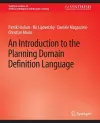
An Introduction to the Planning Domain Definition Language
4 authors - Paperback
£54.99
Patrik Haslum received his Ph.D. in computer science from Linkoping University in 2006, and he is currently at the Australian National University in Canberra. His main area of research is AI planning, with a focus on problem modelling and bridging planning and optimisation.Nir Lipovetzky is a Lecturer at the School of Computing andInformation Systems at The University of Melbourne. He received his Ph.D. in Computer Science from Universitat Pompeu Fabra, Barcelona. His main research area is Automated Planning, Search, Optimization, and Operations Research. He received the International Conference on Automated Planning and Scheduling (ICAPS) best dissertation award in 2013 for his work under the supervision of Prof. Hector Geffner, the ICAPS best paper award in 2015, and the winner and runner-up awards in two tracks of the International Planning Competition (IPC) in 2018. He served as program chair for ICAPS 2019.Daniele Magazzeni is an Associate Professor at King's College London. He received his Ph.D. in Computer Science from University of L'Aquila in 2009. His research interests are in safe, trusted, and explainable AI, with a particular focus on AI planning for robotics and autonomous systems, and human-AI teaming. He is the President-Elect of the Executive Council of the International Conference on Automated Planning and Scheduling (ICAPS).Christian Muise is a Research Scientist at the MIT-IBM Watson AI Lab, where he researches data-driven techniques for inducing behavioural insight and leads a project devising next generation dialogue agents. Prior to this, he was a Research Fellow with the MERS group at MIT's Computer Science and Artificial Intelligence Laboratory studying decision making under uncertainty, and prior to his time at MIT, Christian was a postdoctoral fellow at the University of Melbourne's Agent lab studying techniques for multi-agent planning and human-agent collaboration. Christian completed his Ph.D. at the University of Toronto with the Knowledge Representation and Reasoning Group in the area of Automated Planning. He is the core developer and active maintainer of the Planning.Domains initiative and has a history of promoting modeling techniques for automated planning.